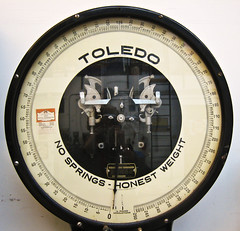Famous Examples of Self-Experimentation [Guest Post]
 Wednesday, April 13, 2011 at 9:23AM
Wednesday, April 13, 2011 at 9:23AM Continuing my guest post experiment, here's one by Louise Baker who writes at Zen College Life. Feel free to propose one of your own. Thanks to Louise. -- matt
Lab rats aren't always the chosen subjects for scientific experiments. Throughout the history of the field, scientists and physicians have been putting their own health and well-being on the line in an attempt to better understand the human body. Some of them were simply trying to better understand the body better; others were actually trying to prove their own theories correct. While they were not all successful, their contributions have led to a greater understanding of our bodies.
The Weighing Chair
In the 1600's, Sanctorius wanted to study metabolism. He weighed himself, as well as everything he ate, drank, and eliminated; every day for 30 years. More than simply weighing himself, he literally lived on the scales. His efforts paid off with a better understanding of perspiration.
LSD
Albert Hofmann, the man who gave us LSD, was the first person to experience an "acid trip." It happened while riding his bike home after accidentally ingesting some of his creation. He intentionally took the drug again and then went on another bike ride to determine if the trip was accidental, or a direct result of the drug.
Knuckle-cracking
Donald Unger wanted to prove that cracking your knuckles did not contribute to the development of arthritis. He spent fifty years cracking only the knuckles on his left hand to make his point. He proudly displayed his hands when he was awarded the Ig Nobel Award in Medicine. His hands are both healthy, with no arthritis. He also pointed out to his mother that she was wrong.
Self-Mutilation for Science
Patients with nerve damage can have trouble expressing how or what they are feeling. Dr. Henry Head wanted to study the effects, and was frustrated by this simple fact. His solution was to slice open his arm and sever some nerves himself. He was very specific, and had another doctor help him. He initially lost all sensation on the arm, but less than 3 months later had almost all the sensation back.
Staring at the Sun
Sir Isaac Newton started at the sun for so long that a black mark developed on the back of his eyelids. He was 22 years old and stared at the sun through a mirror. He wanted to study those after-images that this kind of exposure leaves on your retinas. He nearly blinded himself.
The Cause of Ulcers
Wanting to prove that the microbe Helicobacter pylori would cause ulcers, physician Barry James Marshall drank a Petri dish full of the bacteria. As a result of his research, thousands of ulcer patients have been treated and ultimately cured with antibiotics instead of taking lifelong courses of acid suppressants.
Scientists that are truly dedicated are often willing to experiment on themselves in order to more accurately collect data and test theories. The potential benefit to the medical field is great. However, they still should take care not to permanently injure or blind themselves in the name of science.
 guest-post
guest-post 

Reader Comments (2)
JBS Haldane, on perforating his eardrums in a decompression chamber - "the drum generally heals up; and if a hole remains in it, although one is somewhat deaf, one can blow tobacco smoke out of the ear in question, which is a social accomplishment."
> Haldane was a keen experimenter, willing to expose himself to danger to obtain data. One experiment involving elevated levels of oxygen saturation triggered a fit which resulted in him suffering crushed vertebrae. In his decompression chamber experiments, he and his volunteers suffered perforated eardrums...
I like this comment about him: "J. B. S. Haldane was one of the great rascals of science." - http://www.stephenjaygould.org/people/john_haldane.html